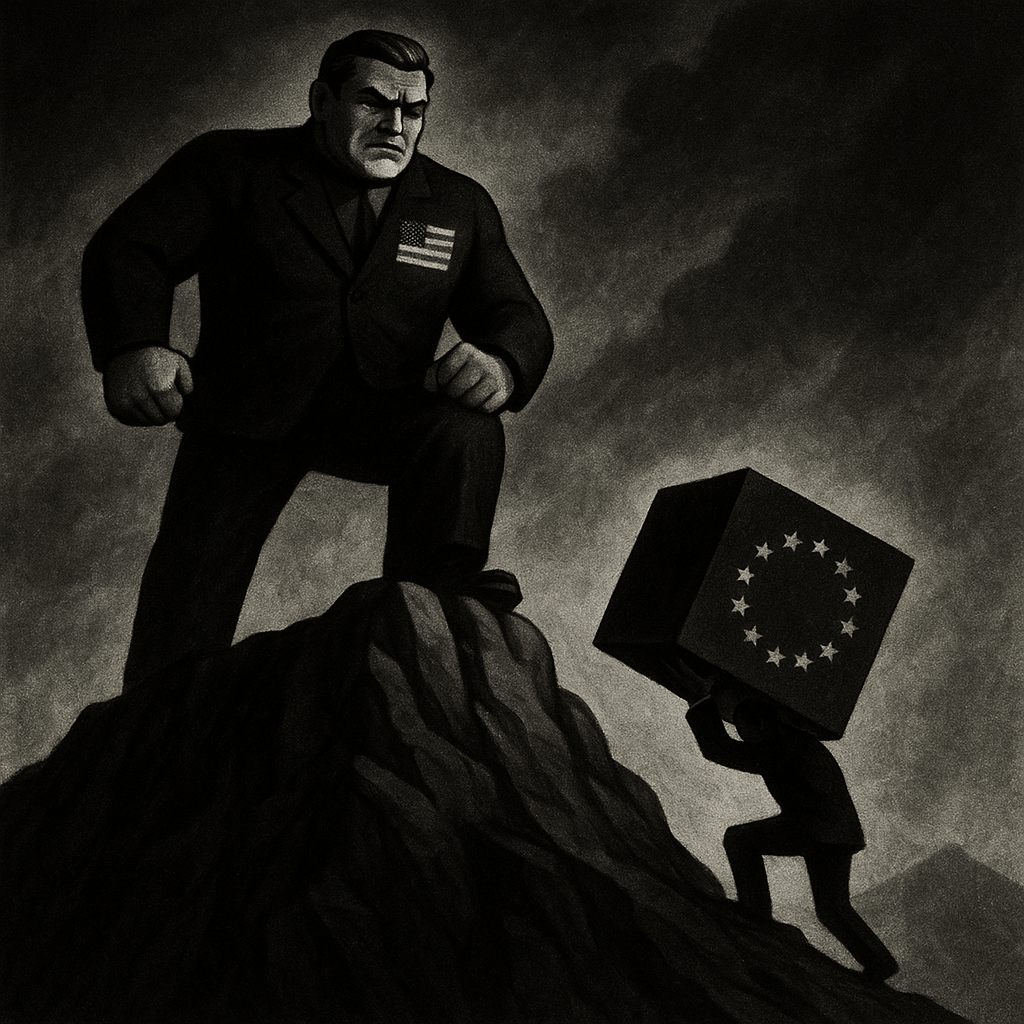The Unbearable Lightness of Europe
A non-agreement on sanctions

Vision Paper
Elaboration of an article originally published by Francesco Grillo.
The unbearable lightness of Europe. Three and a half years ago, a few days after the invasion of Ukraine, what raised the most concern was the lightness of our feelings and, with it, our ability to react. On that occasion, it was a former comedian turned prime minister who found the courage to reverse a story that seemed already written and gave us the chance to defend what defines us. Three and a half years later, we seem even more unbearably transparent. Faced with the horror of Gaza and the idea that our best ally has become an adversary, Europe finds itself once again exposed - more naked than ever. And what is most worrying is that European society as a whole - not just its leadership - feels powerless. Reduced to the hope that the next vacation (if we even manage to find a destination not yet at war within an hour’s reach) might at least give us a month’s reprieve from having to think about the future. And yet, as the uncertain outcome of the tariff negotiations demonstrates, the knot is increasingly tight: either we accept the idea of sacrificing part of an increasingly fragile stability, or we are condemned to play a game that is not ours. And to lose.
The outcome, hailed from Scotland by Ursula von der Leyen as the "greatest trade deal" in history, has less negative economic consequences than previously feared. The problem is that these consequences remain highly uncertain. In the short term, it is unclear to what extent European companies will be able to pass on to American consumers the cost of the 15% tax applied to all goods still arriving at U.S. customs. Nor is it a guaranteed that European exports will benefit from tariffs that have increased less than those imposed on other major U.S. trading partners (China, Canada, Mexico): the price of a Volkswagen car could rise less than that of a BYD produced in Shenzhen, and this could paradoxically create a competitive advantage.
And yet, the Union's defeat is evident on a political level. We are unable to propose any alternative game plan to the one imposed by the President of the United States. In the end, a poker player has already won the moment the others agree to sit at his table, and that must be the underlying logic of behaviors we are unable to rationalize.
The statement released from the world's most exclusive golf course says that Europe has failed to propose anything beyond adopting Trump's tactic of declarations that cannot be converted into commitments. Indeed, they seem tailor-made for endless renegotiation. Otherwise, it is difficult to understand why the level of tariffs would be conditional, for example, on Europe's "intention" to purchase a volume of gas that the United States would be unable to supply in any case. We are embracing the logic of proceeding on a deal-by-deal basis, fully aware that this will never eliminate the uncertainty for which businesses are already paying the price. And we accept this because the framework we once used to manage what some call complexity has collapsed.
Multilateralism is almost gone, and building a new governance model requires new ideas - as well as the ability to adapt, which conflict inevitably demands. Adaptation means facing the risk of being left behind, as Giuseppe Vegas noted a few days ago, for example, without access to the cloud for a time - the time it would take to develop a European digital offering.
Trump wins on the political and symbolic level (while waiting for imperfect markets to decide who to believe) because Europe finds itself without ideas and without the courage to move forward, alongside those willing to do so and without wasting time on impossible unanimity, down alternative paths. And it is precisely this carelessness that renders us voiceless, even in the face of the horror pounding away at the very values on which our project was built. It is clear that we cannot but respond to the tragedy in Gaza with the same resolve we summoned to defend Kyiv and its “accidental heroes.” Today, the heroes are doctors (many Italian and French) who are trying to save the conscience of a Europe once again left watching through a keyhole. The martyrs are two million teenagers taken hostage by the same terrorists who kidnapped hundreds of their peers two years ago. And now, the massacre is edging ever closer to an unspeakable possibility - for a people who have already endured the most ruthless of genocides. Those people are an integral part of our values, our culture. Of the guilt we have learned to remember, a memory that gives meaning.
But once again, history – and the confrontation with those who are part of your history - requires a strength that this frivolity denies us. Trump's success, the continued support for Putin, and that of those who imagine emptying the Gaza Strip are the reflection of the inability of a society unaccustomed to conflict to conceive any kind of vision. It is the opposite of the condition described by those who once spoke of another kind of “frivolity” - that of the intellectuals in Prague striving to overcome conformism and reclaim their freedom. We, by contrast, are gradually losing our freedom, continually postponing the moment when we will have to truly reckon with the end of a world to which we can no longer imagine an alternative.
Sources:
Politico. July 2025. EU-US trade deal: The biggest losers and (a few) winners. Link.
The Financial Times. July 2025. The EU has validated Trump’s bullying trade agenda. Link.
European Commission. July 2025. EU-US trade deal explained. Link.

